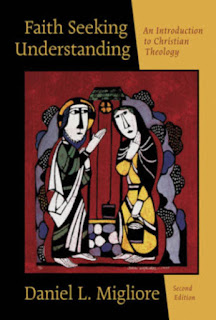This is the first post in a series reviewing Daniel Migliore's book Faith
Seeking Understanding: An Introduction to Christian Theology. For other posts in this series, click a number: 2, 3, 4, 5.

To my knowledge, this is one of the best systematic theologies written from a fully Trinitarian, incarnational perspective - what Migliore calls "The fullness of trinitarian faith and its relational understanding of God, creation, reconciliation, and consummation" (pxii). For Migliore, to participate as a community of faith in the task of systematic theology, is to ask four basic questions (pp11-15):
- What is the gospel? Are the proclamation and practice of the community of faith true to the revelation of God in Jesus Christ as attested in Scripture?
- What is the whole gospel? Do the proclamation and practice of the community of faith give adequate expression to the whole truth of the revelation of God in Jesus Christ?
- What is the present gospel? Do the proclamation and practice of the community of faith represent the God of Jesus Christ as a living reality in the present context?
- What is gospel-focused discipleship? Does the proclamation of the gospel of Jesus Christ by the community of faith lead to transforming practice in personal and social life?
Concerning discipleship, Migliore writes,
All these questions presuppose an inseparable bond between our trust in God's grace and our call to God's service. The gospel of Jesus Christ proclaims God's gift of forgiveness, reconciliation, freedom, and new life. But the gift of God enables and commands our free, glad, and courageous discipleship. Theology and ethics are thus conjoined.... True faith works through love (Gal. 5:6). We cannot seriously receive God's gift of new life without asking equally seriously what God commands us to do. Theology exists to remind us of God's gift and command, and thus to keep alive the question: What would it mean for us personally and corporately to bear a faithful and concrete witness to the crucified and risen Lord in our world today? (p15).
 To my knowledge, this is one of the best systematic theologies written from a fully Trinitarian, incarnational perspective - what Migliore calls "The fullness of trinitarian faith and its relational understanding of God, creation, reconciliation, and consummation" (pxii). For Migliore, to participate as a community of faith in the task of systematic theology, is to ask four basic questions (pp11-15):
To my knowledge, this is one of the best systematic theologies written from a fully Trinitarian, incarnational perspective - what Migliore calls "The fullness of trinitarian faith and its relational understanding of God, creation, reconciliation, and consummation" (pxii). For Migliore, to participate as a community of faith in the task of systematic theology, is to ask four basic questions (pp11-15):